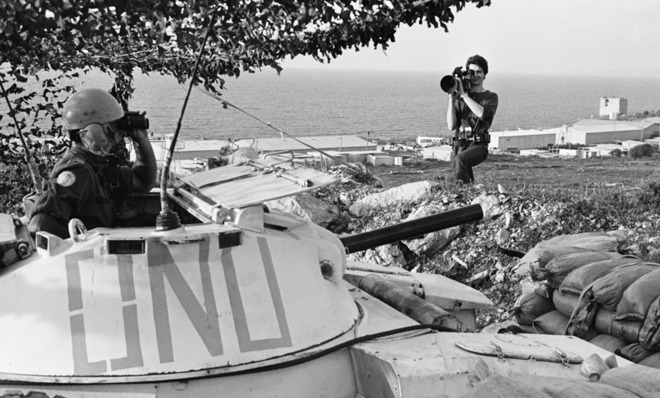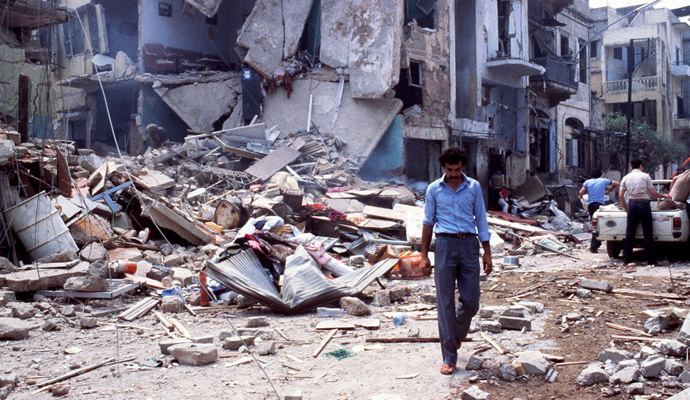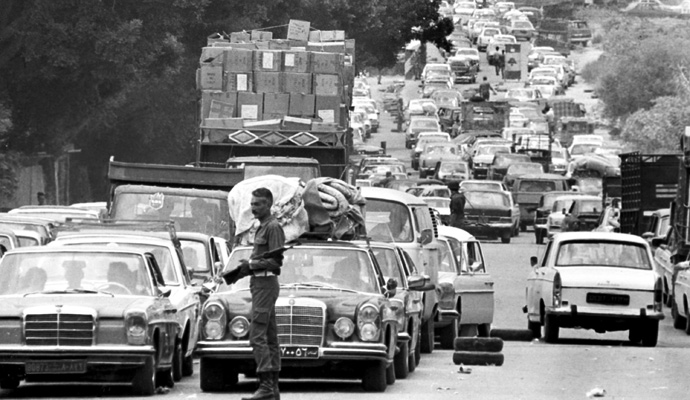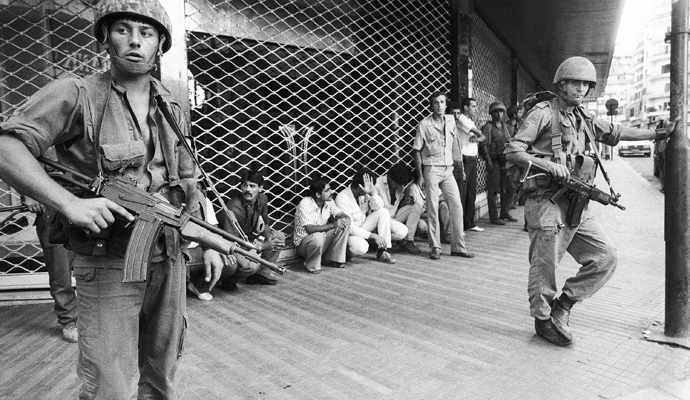The light in Beirut
Waiting to die on a late afternoon in August, 1982

A free daily email with the biggest news stories of the day – and the best features from TheWeek.com
You are now subscribed
Your newsletter sign-up was successful

Up against a wall, waiting to die on a late afternoon in August 1982, a journalist's life stops and then starts over.
What do you think?
Bright, bright light. So bright it blinds me.
The Week
Escape your echo chamber. Get the facts behind the news, plus analysis from multiple perspectives.

Sign up for The Week's Free Newsletters
From our morning news briefing to a weekly Good News Newsletter, get the best of The Week delivered directly to your inbox.
From our morning news briefing to a weekly Good News Newsletter, get the best of The Week delivered directly to your inbox.
Because the guy with the rifle, who is about to kill me, has me standing up against the wall, I cannot avoid the light, and cannot even shuffle my feet slightly to escape it. I can't do anything. Can't bend. Can't run. Can't do diddly. Just die.
So this is how it ends?
Strange. I am young. Don't I have more time? Thought so.
It's not the burning yellow sunlight, but an intense white light that distracts me most as I wait here on this miserable, stinking, war-pocked street of bombed-out buildings in bombed-out West Beirut.
A free daily email with the biggest news stories of the day – and the best features from TheWeek.com
I'm the afternoon show for a crowd of people waiting to see somebody beside themselves get blown away.
I wait here just up the hill and beyond a heap of rotting food and garbage, standing next to a partially collapsed, bullet-riddled wall. Waiting my turn.
I'm next.
My suitcase is at my side, where I dropped it in the dirt. I am facing the short, pudgy, balding gunman in need of a shave. He is pointing a high-powered rifle at my chest.
I guess I'll die soon. Bullets. I'll tumble. Backwards. Maybe forwards. Who knows? I've never done this before. When it's over, I guess they will turn away and leave me here with the rest of the blood-smashed, bad-smelling junk of war that fills this part of Beirut.
The street is empty except for the handful of people watching me. Nobody in their right mind would wander into this bend in the road, where abandoned buildings resemble sun-drenched mausoleums.
It is another gate to hell here: The last checkpoint on the way in or out of besieged, maddened, and desperate West Beirut. I am a reporter. It is August 1982.
The day I arrived, a middle-aged Lebanese man told me about seeing someone run out into the street in West Beirut after an Israeli bombing attack hit his house and killed someone in his family. The man ran and slit the throat of the first person who passed by — an Arab just like him, an Arab trapped in the vise of war. "He was crazy from the war," the Lebanese man said. "War is crazy. Be careful."
I try to seem calm. I feel a shiver.
The problem is, the scene in front of me right now is fading out very quickly because I am fixating on the white light coming from nowhere and everywhere.
It throbs. It floods out the mean-tempered jerk in a dark green, military camouflage jacket facing me. I just can't ignore the light. And the more I focus on it, the more buttons and wheels shut down in my head.
Click. Reason.
Click. Strategy.
Click.
More from The Bigroundtable: After the tsunami
As the wheels turn off, I feel like I am in a swoon. I am not sweating. I seem to be breathing regularly. A few nights ago, when the fighting in the street got really violent here, I had trouble catching my breath in the basement of the low-budget hotel where we were waiting it out. But not now. I am not shaking, either, thank goodness.
Something like this happened not so long ago at a Syrian border check-post. My body shook so much then, though I did everything to stop it. The soldiers were saying we were Israelis, or that we were working with the Israelis, because we couldn't show in our passports how we had entered Jordan on the way to Syria. Dummies, we had, indeed, come from Israel. Foolishly we — myself and two colleagues — had not asked how this is done. We had no idea that the lack of an entry stamp to Jordan would give us away. Naïve journalists. First-timers in war.

That day, I looked outside and through a window, saw a bus marked bound for Istanbul. I fantasized about leaping through the window, rushing to the bus, and yelling in Turkish for them to save me. My Turkish was so good then, from my days in Turkey as a U.S. Peace Corps volunteer, that it came almost naturally to me. Ultimately, hours later, the Syrians walked us to the border, drew the narrow, wooden, border gate down behind us in the near total darkness, and ordered us to walk back to Jordan.
Hours after that all-night confrontation with Syrian soldiers, I could not shake the feelings of having been vulnerable, of being horribly ashamed of my fear, and, worse, realizing that I had been out of control.
But for all the hours of putting up with the bluffing and nastiness, for all the time that we stood there in that small room with only a single window facing a highway, our faces lit by a naked light bulb and the young, unfriendly soldiers shaking guns in our faces, for all that, the Syrians didn't say they wanted to kill us, like the gunman now says he is going to do to me.
While I have time, I am silently saying good-bye to my wife, Suzanne, and my young son, Noah, and my daughter, Leyla. They are standing off somewhat in the distance and smiling pleasantly back at me. It seems almost as if they are poised for a warm, cheery, colored photograph that will sit in a frame on a living room table: heads titled properly but awkwardly, all neatly dressed. And yet I am talking to them. They are back in Detroit.
Good-bye. So long. Please take care. Love you always. Love you a lot. Help Mom. See'ya. Love you all.
But I can barely make them out, because the white light is drowning them and everything and everyone else out — the gunman, his militia pals, the taxi driver who I came here with, and the bystanders, standing just behind the gunman. They have gathered in the rubble and dirt and sunlight to witness the fact that anything can happen anytime in war and most of the time it is blood-raising brutal. I'm the next show. Murder coming up in a minute. See Amerikan die.
More from The Big Roundtable: The man who hid an an airplane bathroom
I am waiting. I say nothing. No begging. No running away. Without thinking, I seem to have preferred this sedate segue, into I do not know what, or when. What I do know is that I can see the white light and it is as bright as ever. The more I concentrate on it, the more I feel myself drawing inward, away from what's happening in front of me. I expect the bullets will hit my chest, probably high up near the shirt pocket. He is only a few feet away.
Out of nowhere, I hear my cab driver, who had been sitting in front of the car when the gunman yanked me out of it. He is yelling out something in Arabic.
"Don't say anything," he hollers to me in English.
I hear them talking in Arabic. I have no idea what they are saying. My little Arabic is no help and I can't really see them because I can't exactly seem to focus my vision. I can't even tell how long this has been going on. Seconds, minutes, hours. I've lost my ability to keep track.

I have slipped into a new time zone: suspended time, dying time, captive time, good-bye time.
Several hundred yards away is the Museum Crossing, the no man's zone where I had been headed. This was the plan: From here, where the taxi would drop me off, I was going to run as fast as I could in the thick, loose sand, hoping the snipers on both sides were too busy trying to kill each other to kill me. Then I would enter Christian East Beirut, where I would go through another string of militia checkpoints. But these would be manned by various Christian factions that were working with the invading Israeli soldiers — people not interested in killing me. After invading in June 1982, the Israelis, along with their Lebanese Christian allies, had surrounded the Palestinians in West Beirut, intent on driving the PLO from Lebanon.
Driving across West Beirut to the checkpoint had been risky. To keep the Israelis from entering Muslim West Beirut, the Palestinians have filled the streets with mines, though my driver says he knows where they are. What worries him, he tells me as we start out, is an air attack by the Israelis. It happens almost every afternoon and can drag on for hours. And driving on one of the empty streets during a bombing in West Beirut is suicidal. That is why, he says, he wants $100 for a ride of just a few minutes. No problem, I say. This is a lot money to me but I have no choice. I had approached him by chance amid a long line of taxi drivers several hours ago, asking for a ride to the crossing. He is a tall, thin, balding man in a loose-fitting white shirt and baggy black pants.
"I would like to take you," he said. "But my vehicle is broken. I need a part for my car. And now with the Israelis around the city I cannot fix it. You cannot find anything here. If you wait for me, maybe four, five hours, I will have the part."
I reply without thinking. "I will come back," I say. I tell him this is my first time in war, and that I can take this time to think. That starts a conversation.
He thanks me and tells me he needs the money. "I am Christian, you know, and these are not bad people, these Muslim people," he says. "I live well with them. My wife, she is in a hospital in East Beirut and I cannot go to her. She was hurt in the fighting."
I tell him I will visit her in the hospital for him. "I will do that for you when I go there," I say. He smiles and looks away. I don't think he expects me back.
It was a warm, pretty day: powder blue skies over the rotten smell of garbage and spent ammunition. I was hungry. I felt vaporized. I had barely any money to spare and was living like a scavenger, eating scraps of bread and water and juice mostly. Food in besieged Beirut is too expensive for my budget. My newspaper, the Detroit Free Press, gave me only so much. They told me to come home when it ran out. I don't want to leave. So I stay on, living in a cheap hotel room.
When I return in several hours to the driver, he is surprised and happy to see me. I tell him I try to keep my word. I don't ask his name. Too much in my head. I think I will do that later.
In my shirt pocket, as we approach the last checkpoint in West Beirut, is my U.S. passport. We pass every militia checkpoint except the last one, and the passport is what gets me stopped here, on the edge of hell, at the post held by one of the most hardline of the fighters. It is controlled by the Mourabitoun, a group of Lebanese Sunni Muslim militants, mostly leftists inspired by Egypt's Gamel Nasser. Their name translates as the marauders and they take their inspiration from the fierce defenders at the time of early Islam.
More from The Big Roundtable: The hotel of enlightenment
As soon as the cab pulls up to the checkpoint, the militiaman gets up from his chair — a thin, metal beach chair — then saunters over to us, leans into the back window, and asks for my passport.

"A-meri-kan," he howls when he sees the cover.
"You give bomb to Isra'elis. Isra'elis kill brother. They use A-meri-kan bomb. I kill you."
I think he said, "yesterday," that his brother was killed yesterday. I'm suddenly having a hard time thinking.
Then he jerks me out of the car and points up a hill a little way and tells me to stand there and wait to die. Up the small slope towards the wall I march, and here is where I wait, ready. I haven't said a word. I am wearing a white, short-sleeve shirt — the only clean shirt I have left. I somehow kept it clean. Suzanne would appreciate this, considering my endlessly messy ways. I guess I will feel the bullets and then stumble a little and then look down at the rapidly spreading red blotch on my shirt and then, and then … I can see the shirt and all. What a mess. I hate it also that I have thin arms that stick out of the short sleeves.
Just as I am crawling deeper into my whitewashed swoon, my well-lit out-of-body flight, the gunman yells up to me. I have to focus, to listen, to see clearly. Damn him. The light is in front of me and around me and now I'm swimming it. I'm not really here. I am out of here. That's okay. I'm out of here. Let's end it already. Get it over.
But then, he tells me to come down towards him.
What?
Moving feet. I stumble forward, unsure what this means. This cannot be good. I don't know what is happening. My feet are shuffling forward slowly but not the rest of me. I am surprised by this. I hope I don't shake. I'm not going to cry or beg. I'm not going to wet myself either.
Maybe it is better this way, closer. Faster. Less pain. Bamm. Gone. This way you won't miss, you dumb bastard. Idiot. Asshole.
But he points to the cab driver standing beside him.
"He say, 'You good man.' I not kill you. I help you. It is bad."
Bad? Huh? Oh, my head isn't working. No. This is wrong. What could get worse?
He points to a place around the bend, through the checkpoint on the way to where the Christian militia is waiting. It is the no man's zone in between the Christians and the Israelis on the outside and the Palestinians and their allies inside West Beirut. It is a target range for bored snipers on slow-going sunny afternoons, like this one. Both sides practice their shooting.
"I give you fighter."
What? This is crazy. You do what?
READ THE REST OF THIS STORY AT THE BIG ROUNDTABLE.
This story originally appeared at The Big Roundtable. Writers at The Big Roundtable depend on your generosity. All donations, minus a 10 percent commission to The Big Roundtable and PayPal's nominal fee, go to the author. Please donate.
-
 How the FCC’s ‘equal time’ rule works
How the FCC’s ‘equal time’ rule worksIn the Spotlight The law is at the heart of the Colbert-CBS conflict
-
 What is the endgame in the DHS shutdown?
What is the endgame in the DHS shutdown?Today’s Big Question Democrats want to rein in ICE’s immigration crackdown
-
 ‘Poor time management isn’t just an inconvenience’
‘Poor time management isn’t just an inconvenience’Instant Opinion Opinion, comment and editorials of the day